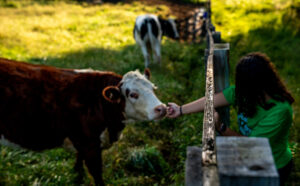Think you have to live in a big city to have a career in STEM (science, technology, engineering, and math)? Think again. Rural areas are experiencing shortages of qualified STEM workers who can provide vital services to often under-resourced areas. Whether you want to work with computers, nature or animals, these are only a few of the STEM jobs that you can pursue in your own, wide-open backyard.
1. Mechanical Engineer: Mechanical engineers have critical duties in manufacturing industries. They are responsible for designing, building, testing, and maintaining the machinery that is used to make any mass-produced products, from computer chips to cars and trucks, and many more. And since manufacturing plants are often located in rural communities, so are mechanical engineering jobs.
2. Agricultural Engineer: Have an interest in both engineering and agriculture? An agricultural engineer combines those two interests and skillsets to modernize traditional farming processes and make them more efficient. Both small farms and large farms need agricultural engineers, so this is a career that can be pivotal to both the health of farms and the local economies that are built around them.
3. Computer Systems Engineer: Computer systems are essential to virtually every industry, including the manufacturing plants, refineries, and other facilities that are often based in rural areas. Computer systems engineers maintain the software and hardware of those computer systems, so these are jobs that are needed in every part of the country.
4. Veterinarian: We often think of vets as the people who take care of our dogs and cats, which they do. However, in rural areas, they may also be trained to aid large farm animals. Plus, a DVM (Doctor of Veterinary Medicine) opens up other career choices, such as researchers and teachers. And you can develop specialties in veterinary health in certain animal species, or clinical specialties like surgery or cardiology.
5. Physician: There is a well-documented shortage of physicians and healthcare workers in rural areas. Becoming a physician is an opportunity to be a vital asset to the community while pursuing a career that is both stable and relatively lucrative.
6. Fisheries Scientist: Rural communities are home to recreational and commercial fisheries, but they don’t run by themselves. Fisheries scientists use their acquired expertise in biology, ecology, statistics, administration, and local policy–among others–to help protect and enhance the sustainability of these critical resources.
7. Satellite Engineer: Satellites are one way people get access to the internet and television – especially in rural areas. Satellite Engineers design these spacecraft, which can be as small as a suitcase or as big as a school bus and must be able to survive in space for many years.
8. Solar Structural Engineer: Oil and gas continue to be the driving force in energy production in our country, but the clean energy economy is growing, and rural areas are increasingly home to large solar panel arrays. Solar structural engineers conduct structural analyses for commercial and utility-scale PV (photovoltaics) power projects, leading the way for the installation and maintenance of these critical structures.
9. Range Manager: Range managers oversee large tracts of land that are used for foraging, wildlife and grazing. They also help ranchers develop grazing practices so these areas are maximized in a sustainable manner.
10. Accountant: All of the small businesses that exist in rural communities – grocers, lawyers, small businesses – need to manage their finances. A rural accountant can work with multiple clients on their own flexible work schedule, offering a valuable service and being an integral part of the local business community.
11. Electrical Engineer: Similar to mechanical and computer systems engineers, electrical engineers create, maintain and upgrade electrical systems in large facilities, including manufacturing facilities and government buildings often found in rural communities.
12. Turf Scientist: Turf scientists use their STEM skills to maintain turf, as well as to operate computer-controlled irrigation equipment and highly technical machines. They typically work outdoors – or manage employees who do – to care for lawns, golf courses, parks, athletic fields, and large open areas on corporate campuses.
13. Marine Biologist: Marine biologists are people who study the animals that live in the sea. They use data and samples that they collect in the field, then evaluate in their labs to develop and test hypotheses about issues affecting these creatures. In a world of climate change and declining ocean health, they increasingly deal with problems of global importance.
You don’t have to leave your town to pursue a STEM-based career, because your passion and interest in science, technology, engineering, and math is needed right where you are. And there are ample opportunities for you to chase your passion to make a difference in your own community.
Visit CLOVER to find more exciting STEM content, including hands-on STEM activities supported by HughesNet that help get your child thinking about a career in science, technology, engineering, or math.
















